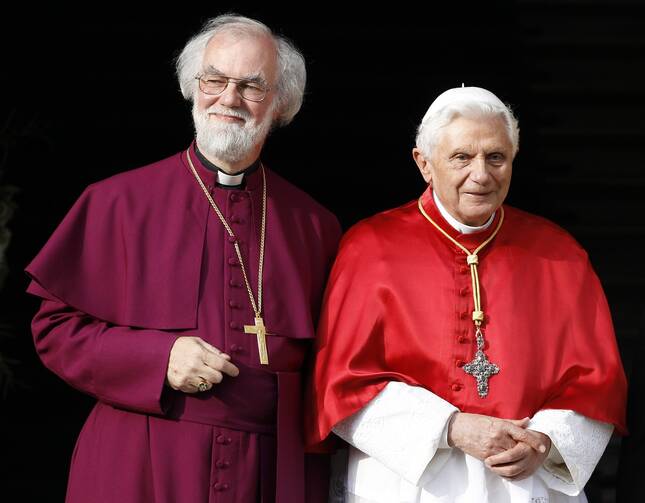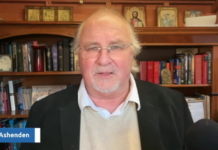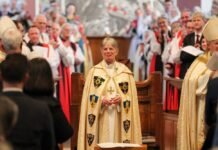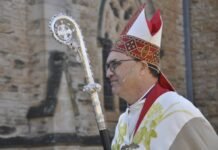
Following Pope Benedict’s death on Dec. 31, Sebastian Gomes, America’s executive editor for audio and video, interviewed journalists, scholars and theologians about the legacy of the pope emeritus. Among those he spoke to was Dr. Rowan Williams, the former archbishop of Canterbury, about the unique challenges of leading a Christian community in the 21st century. Both leaders served in their roles at roughly the same time, and faced a crisis when Pope Benedict created a pathway for Anglicans to enter into full communion with the Catholic Church. This text of this interview has been edited for length and clarity.
Sebastian Gomes: Dr. Williams, you served as the archbishop of Canterbury from 2002 until 2012, almost the exact same period that Joseph Ratzinger served as pope of the Catholic Church, from 2005 to 2013, and that means there were several formal occasions for the two of you to meet. I’m wondering if any one of those encounters was especially meaningful and memorable for you personally.
Rowan Williams: I suppose what I remember most vividly is the rather domestic moments, the first time I sat down one-to-one with him, the first time we had a private lunch together, and the great deal of pasta sauce in his private apartments, and also when my family and I were able to welcome him in Lambeth Palace to our own home for tea and cakes.
I think that was the first time that a pope had entered Lambeth Palace, is that correct?
I believe so, yes. And it was a wonderful afternoon, which I shall never forget, nor will my family or my staff.
Most of us think about the pope, and talk about the pope, and see the pope from a distance, but you’ve had this chance to interact with him one on one. What was he like in those personal meetings?
I found him, not surprisingly, rather a shy person. He was very much a German professor, in some way, but I was very pleased to discover he had a real sense of humor, very quiet and very dry. And there was a warmth in our encounters, which I always greatly valued. I found him, essentially, someone of real personal humility and willingness to listen—not always the picture people had, I know, but in our personal encounters, I think, [someone of] a great deal of grace.
Rowan Williams on Pope Benedict XVI: I think that strong sacramental sense of the fellowship we were in, the sense of the body of Christ, that was one of the things which we both found sustained us in our work.
Tweet this
As a former archbishop of Canterbury, you were in a similar position, a similar ministry as Pope Benedict XVI, overseeing a community of Christians, of believers, of vastly different opinions, of different cultures, navigating very complex debates internally and adapting to a rapidly changing world around you. I’m just wondering what it’s like to be in that position, and if you felt a kind of camaraderie with a person like Pope Benedict, who found himself in a similar position in a similar historical moment.
In many ways, I suppose the two of us would have found it quite difficult to identify anybody else who had quite the same set of stresses and strains. And so I think that did help to create a sense of warmth and friendship between us even when we were not, because we weren’t, in full agreement on things. We recognized the kinds of tension that the other would be feeling. I think it’s also fair to say that we both came from a theological background in which there was a very, very powerful sense of the church. The sacramental fellowship of the church was something given; it wasn’t something you created, invented, something that depended on you. And I think that strong sacramental sense of the fellowship we were in, the sense of the body of Christ, that was one of the things which we both found sustained us in our work.
I have one memory which perhaps is an answer to two of your questions, and that is just before the beatification of John Henry Newman. This was a time when our Anglican family was particularly fractious and quarrelsome. And I was talking over a meal with Pope Benedict about the canonization, about Newman, and about also the requirement of miracles for canonization. And I remember saying to him, “Do you think if I asked for the intercession of John Henry Newman to keep the Anglican Communion together for the next six months, and it succeeded, that would count toward canonization?” And he looked at me very solemnly and said, “Yeah, I think that would be a miracle.”
That’s a wonderful story.
He had a sense of humor.
Rowan Williams on the Anglican Ordinariate: I didn’t regard it, as some wanted me to, as a great insult or a great provocation. I saw it as a pastoral step.
You’ve spent a significant amount of your time and energy on interfaith initiatives, so I know dialogue and bridge-building with people who believe different things is very, very important to you. And I’d like to ask you specifically about the dialogue between the Catholic and Anglican churches, particularly the influence of Pope Benedict on that dialogue. The dialogue has been going on for some time. Perhaps before we get into that broader influence, we can look at something very particular that a lot of people point to when they think about this topic, and that is the creation of the Anglican Ordinariate.
So, I think it was early November of 2009, and Pope Benedict issued an apostolic constitution, essentially creating an official pathway for Anglicans to enter into full communion with the Catholic Church. And it did so through the establishment of these personal ordinariates, which function a bit like dioceses and that allowed for Anglicans to preserve their liturgical and spiritual heritage. This was big news, obviously, and a really important development in the context of much broader ecumenical conversations that have been going on between our churches.
You were archbishop of Canterbury at the time. I’m just wondering what you made of that decision and how, in your mind, that impacted the ecumenical dialogue between our churches.
It’s really quite a complicated question, that, and I think there are two things I’d want to underline in response. One is that I think I and many other Anglicans would have been happier if we had been more directly involved in the discussions about this because it came as a surprise to us, and I think as a surprise to some people in the Catholic Church, as well. And some of the language about it at times, a bit exaggerated. There was a U.K. newspaper which said that the pope had his tanks on my lawn, which wasn’t quite how I saw it, but there was that rather dramatic reception. So it would have been good to have a bit more advanced discussion and notice.
The other thing I remember saying at the time was: This is a very important pastoral provision for traditionally minded Anglicans who are feeling alienated by some of the directions the Anglican Communion was going. It’s an important pastoral provision; I’m not sure how much it does for the reconciliation of our communions as a whole. That feeling was shared by people on both sides. So I didn’t regard it, as some wanted me to, as a great insult or a great provocation. I saw it as a pastoral step. Equally, I wasn’t sure that it contributed greatly to the real ecumenical challenge, which is reconciliation of real diversity in a single sacramental body.
A complicated episode, but it happened not long before I was due to go to Rome for one of my regular visits to see Pope Benedict. And there were some who said, “Well, you shouldn’t go; this is an act of war.” But I said, “That’s completely ridiculous, I need to go. I need to keep the friendship, and we need to keep the routine discussion between our churches on an even keel.” And that’s exactly what happened. Together, we set in motion the next round of official talks between our two communions and the creation of the ordinariate didn’t disturb [that]. And I think for some people it’s been contexts where they’ve flourished, and what can we do but give thanks to God? But there is a much bigger task to do for the reconciliation of the two communions as a whole.
Rowan Williams: Pope Benedict was somebody committed to working with other Christians, committed to keeping the door open.
Tweet this
You mentioned the creation of the ordinariate as a pastoral decision from Pope Benedict, is how you interpret it. You’re reflecting on the much broader significance and importance of continuing the ecumenical dialogues that we have between our churches. Can you comment specifically on that, on how Pope Benedict influenced that broader ecumenical movement? This is an evolution, a trajectory that’s been developing since basically the Second Vatican Council with the Catholic Church officially. What was Benedict’s contribution to the evolution of that movement, which still has a long way to go?
Well, as I said, the two of us agreed on the next round of official talks with the ARCIC, Anglican-Roman Catholic International Commission. We discussed the agenda for that, we knew that we would have to be discussing matters around ethics, about the doctrine of human nature. And I think he was more than willing that that discussion should continue, and he was deeply encouraging of the local initiatives that we took on that front. In my time, we used to have every year a day of recollection, which the Anglican and Roman Catholic bishops would share together. Relations were extremely warm and cordial in the U.K. between the bishops, and I still wear the ring that was presented to me by Cardinal Murphy O’Connor when he retired, as a sign of our very deep friendship.
So, there was all of that local work, which I think the pope was delighted to see, and also there were those significant invitations, for example, to the Assisi event. That was an important moment for many of us working together. I was received with great generosity and warmth, visiting Rome, being invited to be seated near the sanctuary in various events. And, of course, he and I together officiated at vespers in the Camaldolese monastery in San Gregorio in Rome, to mark the millennium of the Camaldolese Benedictine congregation. So there were any number of signs of mutual respect and consideration, which, I think, translated into a sense that Pope Benedict was somebody committed to working with other Christians, committed to keeping the door open.
The address in Westminster Hall was possibly the most significant moment of the visit.
Read it all in America


